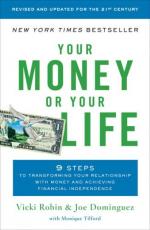
|
| Name: _________________________ | Period: ___________________ |
This test consists of 15 multiple choice questions and 5 short answer questions.
Multiple Choice Questions
1. Participants will end up making more money than they spend if they do what?
(a) Follow the philosophy of "no shame, no blame."
(b) Conserve life energy.
(c) Retire early.
(d) Maximize income and minimize expenses.
2. What is one advantage of estimating the likely timing of the crossover point?
(a) People retire early.
(b) People tend to leave their current job for a more enjoyable one.
(c) People spend less.
(d) People may become more eager about going to work and doing a good job.
3. What should retired people do with their excess monthly income?
(a) Use it to buy life energy.
(b) Reinvest it or use it to do new projects.
(c) Determing a new crossover point.
(d) Help other family members reach the crossover point.
4. Prestige, status, and power can be reasons for what?
(a) Choosing a certain job.
(b) Retaining life energy.
(c) Early retirement.
(d) Keeping up with the neighbors.
5. Why should people try not to turn their job into an identity?
(a) Only volunteerism creates an identy.
(b) Identity comes from friends and family.
(c) Changing careers could cause an identity crisis.
(d) So that their lives could be about something different.
6. What usually happens after a person retires from their job?
(a) Expenses and income stay about the same.
(b) Income goes up.
(c) Expenses go up.
(d) Expenses go down.
7. Why do people feel very free when volunteering?
(a) Because they do not have to be there, and can do things their way.
(b) Volunteering can lead to job offers.
(c) Volunteering requires no skill.
(d) Volunteer work is unpaid.
8. What should people be willing to do?
(a) Work for what they want.
(b) Sacrifice family time for more income.
(c) Work more than 40 hours per week.
(d) Sacrifice income for a job that matches a passion.
9. How does eating a proper diet make sense financially?
(a) Eating less saves money.
(b) Eating good foods can prevent illnesses and reduce medical costs.
(c) Losing weight means no money spent on gym memberships.
(d) Eating three meals a day saves money.
10. Where do the authors recommend finding job-hunting advice?
(a) The Internet.
(b) "What Color Is Your Safety Net?"
(c) Friends and family.
(d) "What Color Is Your Parachute?"
11. What do the authors warn job-hunters to avoid?
(a) Spending a lot of money on schemes to find the perfect job.
(b) Taking a job that requires relocation.
(c) Taking the first offer that comes along.
(d) Taking a job too closely connected to a hobby or passion.
12. What mistake do people often make, when describing their jobs?
(a) Saying uncomplimentary things about thier supervisors.
(b) Identifying themselves by their careers.
(c) Playing down their true talents.
(d) Revealing annual income.
13. What is the recommended size of the wall chart?
(a) From 18 to 22 inches tall, and from 24 to 36 inches wide.
(b) From 18 to 24 inches wide, and from 22 to 36 inches tall.
(c) From 18 to 24 inches tall, and from 22 to 36 inches wide.
(d) From 18 to 22 inches wide, and from 24 to 36 inches tall.
14. What percentage of useful life objects could people add if they were not so anxious to replace them?
(a) Ten percent.
(b) One hundred percent.
(c) Fifty to eighty percent.
(d) Twenty to fifty percent.
15. What are some good alternatives to buying what is needed?
(a) Trading, sharing, and retiring.
(b) Sharing, trading, and stealing.
(c) Borrowing, trading, and sharing.
(d) Begging, stealing, and borrowing.
Short Answer Questions
1. Paying attention to every thought and deciding whether to act on each thought is crucial to what?
2. What are 1,001 SURE WAYS TO SAVE MONEY?
3. Being financially independent requires what?
4. Participants should always remain conscious of what?
5. If people invest more money each month, what happens to the monthly interest?
|
This section contains 655 words (approx. 3 pages at 300 words per page) |

|




